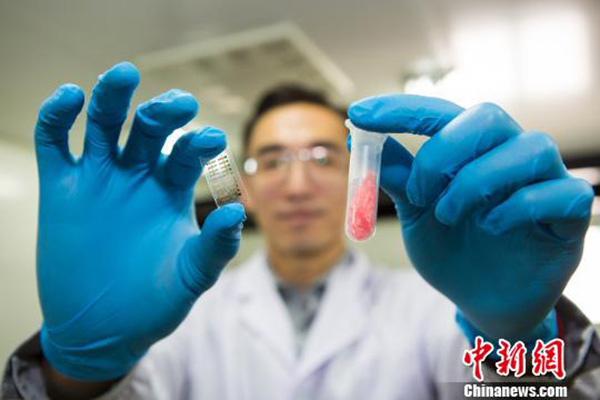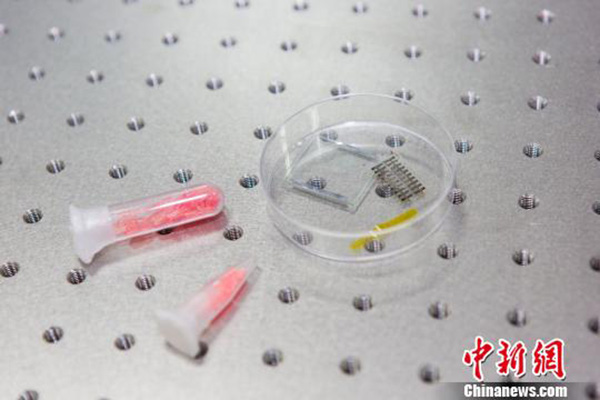


Professor Xiong Rengen shows his new findings in the lab. (Photo/Chinanews.com)
Can you imagine the day when you can charge your smartphone simply by stretching in your clothes? A research team from China’s Southeast University has found a new organic-based piezoelectric material that could help this become reality, Chinanews.com reported.
Piezoelectricity refers to electric polarization in a substance, especially certain crystals, caused by mechanical stress. According to Professor Xiong Rengen, who heads the research team, piezoelectric materials have already been applied to various fields, such as spaceflights, submarines, missiles, and medical ultrasounds.
Traditional inorganic piezoelectric materials, such as ceramic, are too stiff to be attached to thin films or electronic components. In addition, thin films and most electronic components get damaged in the extremely high temperatures under which those materials are made.

The new organic piezoelectric materials (Photo/Chinanews.com)
The new organic-based perovskite structured piezoelectric material is far more pliable yet has a piezoelectric response similar to traditional materials. It is also cheaper, lighter, and more environmentally-friendly.
"The molecular piezoelectric materials will further shrink the size of computer chips, making it possible to manufacture flexible heart rate meters and ultrasound machines," Xiong noted, expressing his confidence in the future application of the material.
The research on this new material was published in the Science on July 21, making China a leader in the field of molecular material research.
 Fire brigade in Shanghai holds group wedding
Fire brigade in Shanghai holds group wedding Tourists enjoy ice sculptures in Datan Town, north China
Tourists enjoy ice sculptures in Datan Town, north China Sunset scenery of Dayan Pagoda in Xi'an
Sunset scenery of Dayan Pagoda in Xi'an Tourists have fun at scenic spot in Nanlong Town, NW China
Tourists have fun at scenic spot in Nanlong Town, NW China Harbin attracts tourists by making best use of ice in winter
Harbin attracts tourists by making best use of ice in winter In pics: FIS Alpine Ski Women's World Cup Slalom
In pics: FIS Alpine Ski Women's World Cup Slalom Black-necked cranes rest at reservoir in Lhunzhub County, Lhasa
Black-necked cranes rest at reservoir in Lhunzhub County, Lhasa China's FAST telescope will be available to foreign scientists in April
China's FAST telescope will be available to foreign scientists in April "She power" plays indispensable role in poverty alleviation
"She power" plays indispensable role in poverty alleviation Top 10 world news events of People's Daily in 2020
Top 10 world news events of People's Daily in 2020 Top 10 China news events of People's Daily in 2020
Top 10 China news events of People's Daily in 2020 Top 10 media buzzwords of 2020
Top 10 media buzzwords of 2020 Year-ender:10 major tourism stories of 2020
Year-ender:10 major tourism stories of 2020 No interference in Venezuelan issues
No interference in Venezuelan issues
 Biz prepares for trade spat
Biz prepares for trade spat
 Broadcasting Continent
Broadcasting Continent Australia wins Chinese CEOs as US loses
Australia wins Chinese CEOs as US loses